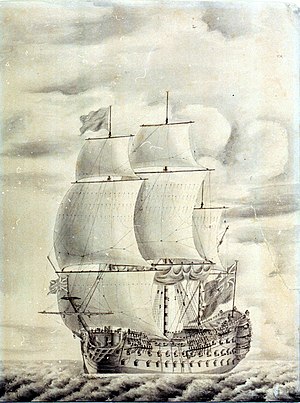HMS Duke (1682)
 Prince George 90 guns, sketched by John Hood in 1701
| |
| History | |
|---|---|
| Name | HMS Duke |
| Builder | Thomas Shish, Woolwich Dockyard |
| Launched | 13 June 1682 |
| Renamed | HMS Prince George, 1701 |
| Fate | Accidentally burned at sea on 13 April 1758 |
| Notes |
|
| General characteristics as built[1] | |
| Class and type | 90-gun second rate ship of the line |
| Tons burthen | 13641⁄94 (bm) |
| Length | 162 ft 10 in (49.6 m) (gundeck) |
| Beam | 45 ft 2 in (13.8 m) |
| Depth of hold | 18 ft 9 in (5.7 m) |
| Propulsion | Sails |
| Sail plan | Full-rigged ship |
| Armament | 90 guns of various weights of shot |
| General characteristics after 1701 rebuild[2] | |
| Class and type | 90-gun second rate ship of the line |
| Tons burthen | 142161⁄94 (bm) |
| Length | 162 ft 10 in (49.6 m) (gundeck) |
| Beam | 45 ft (13.7 m) |
| Depth of hold | 18 ft 7 in (5.7 m) |
| Propulsion | Sails |
| Sail plan | Full-rigged ship |
| Armament | 90 guns of various weights of shot |
| General characteristics after 1723 rebuild[3] | |
| Class and type | 1719 Establishment 90-gun second-rate ship of the line |
| Tons burthen | 158616⁄94 (bm) |
| Length | 164 ft (50.0 m) (gundeck) |
| Beam | 47 ft 2 in (14.4 m) |
| Depth of hold | 18 ft 10 in (5.7 m) |
| Propulsion | Sails |
| Sail plan | Full-rigged ship |
| Armament |
|
HMS Duke was a 90-gun second-rate ship of the line of the Royal Navy, launched on 13 June 1682 at Woolwich Dockyard.[1][4]

She underwent a rebuild in 1701 as another 90-gun second rate, and was renamed HMS Prince George[2] (after the future George II). After her rebuild, she served in the War of the Spanish Succession, fighting in the Battle of Málaga and the capture of Gibraltar.
On 4 November 1719 Prince George was ordered to be taken to pieces and rebuilt at Deptford by Richard Stacey, and she was relaunched on 4 September 1723 as a 90-gun second-rate built to the 1719 Establishment.[3]


In June 1757 Prince George was taken into Portsmouth Dockyard for repairs. The work took four months to complete at a total cost of £9,513, after which the ship was recommissioned as the flagship of Rear Admiral Broderick. On 13 April 1758, Prince George was at sea in the Bay of Biscay when a fire broke out below decks. The flames quickly spread throughout the ship and she foundered with the loss of 485 out of 745 crew.[6]
Notes
[edit]- ^ a b Lavery, Ships of the Line, vol. 1, p. 162.
- ^ a b Lavery, Ships of the Line, vol. 1, p. 166.
- ^ a b Lavery, Ships of the Line, vol. 1, p. 169.
- ^ "British Second Rate ship of the line 'Duke' (1682)". Threedecks. Retrieved 27 August 2019.
- ^ To Commemorate the Commissioning of HMS Invincible in the Presence of Her Majesty the Queen (PDF). 1980.
- ^ Winfield 2007, pp. 13-14
References
[edit]- Lavery, Brian (2003) The Ship of the Line – Volume 1: The development of the battlefleet 1650-1850. Conway Maritime Press. ISBN 0-85177-252-8.
- Winfield, Rif (2007). British Warships in the Age of Sail: 1714-1792. Seaforth Publishing. ISBN 9781844157006.
External links
[edit] Media related to HMS Prince George (ship, 1682) at Wikimedia Commons
Media related to HMS Prince George (ship, 1682) at Wikimedia Commons
